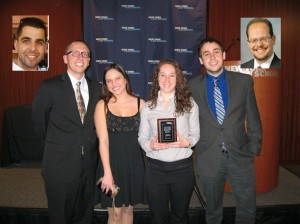Congratulations to the 2015 Marquette Wagner Moot Court Competition Team
 Congratulations to 3Ls Angela Harden, Amanda Luedtke, and Samuel Weinberg for reaching the quarterfinals of the 39th Annual Robert F. Wagner National Labor & Employment Law Moot Court Competition in New York this past weekend. The team also took second place for its Respondent’s brief. This year’s competition was comprised of 41 teams.
Congratulations to 3Ls Angela Harden, Amanda Luedtke, and Samuel Weinberg for reaching the quarterfinals of the 39th Annual Robert F. Wagner National Labor & Employment Law Moot Court Competition in New York this past weekend. The team also took second place for its Respondent’s brief. This year’s competition was comprised of 41 teams.
Professor Paul Secunda served as the team’s faculty advisor, and Attys. and Marquette Law alumni Jesse Dill and Tony Flint coached the team. This year’s Wagner problem involved application of the WARN Act to a plant closing of an oil company (Fazal Oil) after a coup de etat occurred in the country where the oil company was located (San Marcos). Specifically, the problem asked whether the Liquidating Fiduciary, Unforeseeable Business Circumstance and Faltering Company exceptions were able to be claimed by Fazal Oil after they closed the San Marcos oil plant without giving the employees the 60 day notice of closing required under the WARN Act. Congratulations, again, to our Marquette Law School team for their tremendous effort in tackling these complex employment issues.
